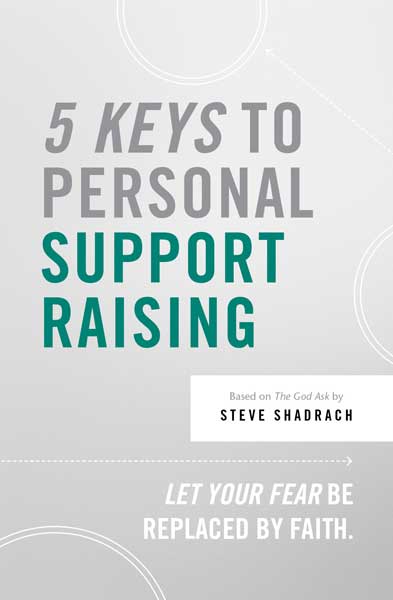
My husband, Mark, and I hadn’t even graduated from college when we began raising our support in 1995. What we lacked in training and coaching we made up for in enthusiasm and youthfulness. However, my enthusiasm began to wane as we got stuck at the 33% mark for 6 months. Without a coach I got discouraged and began to question my calling.
Fast forward to 2018 when we changed ministries and needed to essentially start from scratch with our support, even though we had lived on support for 23 years. We had several people leave our team for various reasons—the change in ministry, retirement, kids headed to college, you know the drill. However, this time was significantly different for me. We had both been through SRS Bootcamp AND we had an MPD (Ministry Partner Development) coach.
We faced many of the same challenges, but our coach made a huge difference for me. Rather than becoming discouraged and questioning my calling I was able to press on. Why? Does coaching really make that much of a difference? YES!
That being said, what makes a good and effective MPD coach?
Listening
This is often referred to as “active listening” to emphasize the difference between passively taking in what the other person is saying and actively engaging with them to show that you are giving them your undivided attention.
Our coach actively listened to me– it’s a powerful experience, partly because it’s so rare. By listening intently to what I was experiencing, he sent a powerful double message – firstly, that he was there to support me in whatever I was doing; secondly, that he was paying attention and expected me to follow through on any commitments I made.
A good deal is rightly written about the importance of listening in coaching, but observing is sometimes overlooked and is a crucial part of “active listening.” What am I talking about? Body language.
I remember one week I didn’t want to meet with my coach at all. I was discouraged and didn’t feel like doing the work of MPD. It had been a rough week emotionally trying to pack up our house of 9 years—our basement flooded with sewage, I had a migraine for 3 days, our oldest had just started college—it created the perfect storm. I honestly hadn’t even thought about MPD that week. Which is why I did not want to come to my weekly coaching meeting. I had my arms crossed, I avoided eye contact and when my coach asked me how I was doing, my words said that I was fine. My body language, however, told him a different story.
Fortunately, my coach observed my body language and asked questions. He affirmed that it had been a difficult week with unforeseen circumstances and told me not to beat myself up. As a result, I didn’t stay in that place of beating myself up. I was able to move past it and start fresh the next week.
Body language is so easy to ignore if we, as coaches, are too focused on our own ideas about what needs to happen next. Listening is a skill. You can learn how to listen better. There are many ways to do this, including:
•Focus on what’s behind their words.
•Don’t let your mind wander.
• Sound interested.
•Let your arms, hands, and body posture say, “I’m interested.”
•What are their non-verbal signals communicating to you?
•Check your assumptions about their non-verbal cues with them (body language, tone of voice, enthusiasm, etc).
•Don’t finish their sentences or provide missing words.
•Don’t give advice or solutions while they are talking.
•Summarize main points.
There are various techniques and models used to teach active listening, these are just a few, but the easiest and most genuine approach is simply to become genuinely interested in the other person and curious about what they can achieve.
Questioning
Speaking of curiosity, asking questions is an expression of curiosity. After my coach observed from my body language that I was struggling, he went beyond the simple “how are you” question to asking about the emotions I was experiencing; which in turn led to me revealing the struggles of my week. It wasn’t until I processed the events of my week that I realized what I was feeling had nothing to do with MPD and everything to do with outside stressors. After I realized that, I was able to stop feeling guilty about my inability to make forward movement with my MPD that week which freed me to let it go and move forward.
Powerful questions evoke discovery, insight, commitment or action. Because powerful questioning is so impactful, I keep a list of some powerful questions nearby for reference while I am coaching. They include:
- What would achieving this do for you?
- What are the underlying issues?
- What parts of this connect you to your calling?
- How might culture be impacting the situation?
- What emotions are you experiencing?
- Which parts of this give you energy?
- How is this affecting your family?
- What additional information do you need?
- What would success look like?
- What difference would more or less time make?
Giving feedback
The key to delivering effective coaching feedback is that it is observational and non-judgmental. What does this look like as an MPD coach? One week my coach challenged my husband and I to brainstorm who we could ask to be “anchor donors” on our team. Mark and I prayed about it and came up with several names. We met with one of those couples that very week to share about our ministry. However, when it came time for the “ask” they jumped in with “We would like to support you guys at $100/month!” before we could even ask them anything. We hadn’t come up with a contingency plan for this, so we didn’t ask them to consider becoming an anchor donor.
One of the most helpful tips that Keith Webb shares about generating feedback as a coach is this:
“Generate feedback by asking the coachee to self-evaluate for a WIN!
What they did Well,
could Improve, and
will do Next time.”
When our coach asked us what we did Well we were able to say that we had prayed about who to ask to consider becoming an anchor donor and got an appointment. When he asked what we could Improve we said that we should have had a better plan for the “ask.” When he asked what we would do Next time we were able to brainstorm and come up with a plan for our next “ask.”
Setting Goals
Clear action steps or goals are like mini vision statements that describe a preferred future. Properly formed action steps motivate as well as form the basis on which to evaluate learning, growth, and performance. One of the beauties of SRS bootcamp is that it teaches best practices for raising support. This proved to be invaluable to me through our support raising journey. I was handed a road map for how many phone calls to make per week, how many in person meetings, etc…many SMART goals were already done for me just by going to Bootcamp. As a coach, how can you add to those and help your staff make additional SMART goals?
SMART goals are:
Specific – clear, unambiguous
Measurable – you can measure or observe its completion
Attainable, yet a stretch – it’s possible for you to complete
Relevant – it’s meaningful to you
Time limited – when you will accomplish it
Coaching plays an essential part in MPD. Sometimes the hardest part is just getting started! If you start with these four essentials you are sure to add value to your coaching for your staff.

